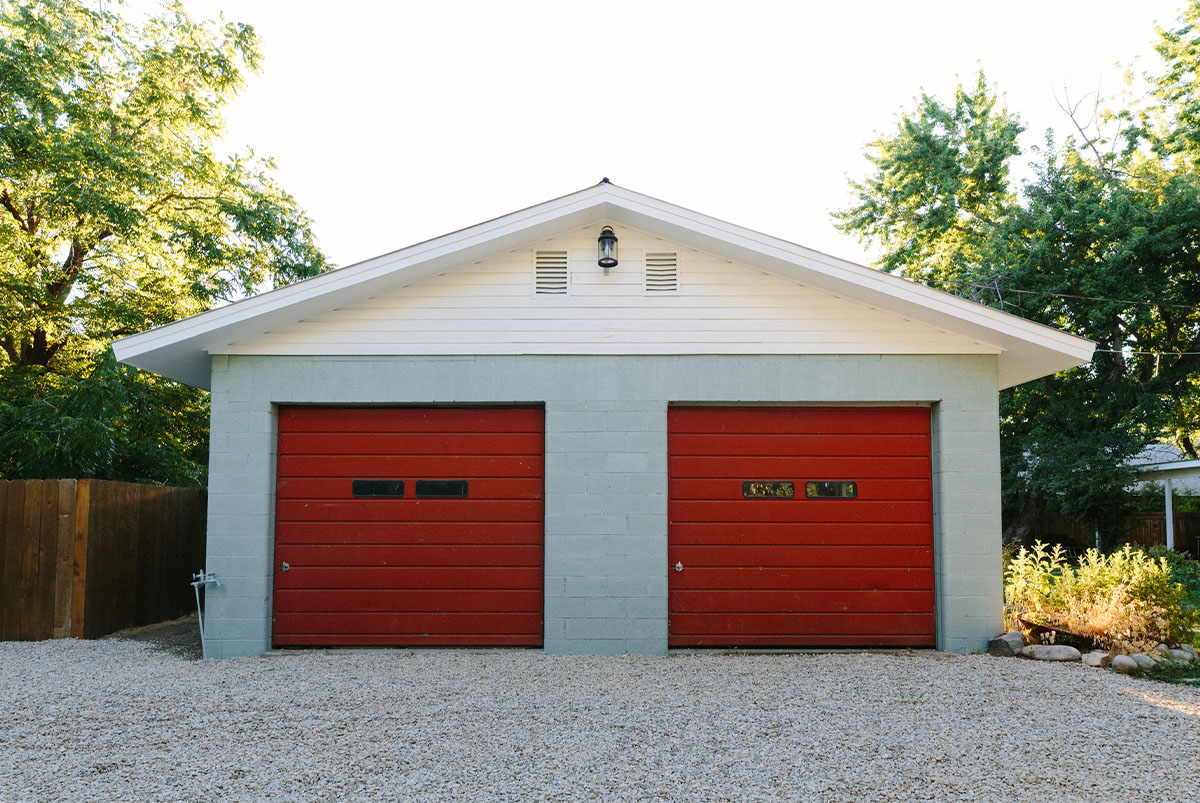Explore your mortgage options
Whether you’re trying to increase your property value or keep your vehicle out of the elements, garages have a lot of benefits for your home. But they don’t come cheap.
If you’re ready to build or remodel a garage, here’s what you need to know about financing a garage and which loan options are available.
Need Funds for Home Improvements?
Apply for a home improvement loan from Rocket LoansSM and start planning your next renovation project.
Checking your options won’t affect your credit score.
Garage Loan Options
Garage construction projects are expensive due to the electrical and material costs required to do the job properly. A single-car garage can cost $10,500. If you build a two-car garage, you’ll spend even more. An oversized garage can cost $16,550 – $40,664.[1]
If you don’t have that kind of cash on hand, don’t worry. There are several types of home improvement loans that can help you finance a garage build from start to finish.
Home equity loans
A home equity loan allows you to tap into your home’s equity and borrow from it. To qualify with most lenders, you need to have 20% equity in your house. Lenders will also review your credit score and debt-to-income (DTI) ratio.
Home equity loans typically offer a fixed interest rate. There are limits to how much you can borrow. You can only borrow 80% – 85% of your home’s equity. If your garage build costs more, you may need to find other funding to complete your construction project.
But exercise caution. Your home acts as collateral to back up the loan. If you fall behind on payments, you could lose your house.
Home equity line of credit (HELOC)
A home equity line of credit (HELOC) is another way to fund your garage build or remodel. Like a home equity loan, a HELOC is based on the equity you have in your home. HELOC interest rates are variable and influenced by the prime rate and the margin set by the lender.
HELOCs operate differently from home equity loans in that there is a draw period where you can take out money up to the credit limit imposed by the lender, usually maxing out at 80% – 85% of the equity available in your home. You’ll then only repay what you borrow (with interest) in the repayment period.
Cash-out refinance
A cash-out refinance can help you add a garage to your mortgage by replacing your existing mortgage with a new loan for your current principal amount plus some of your home’s equity. Since you’re refinancing and taking out cash to pay for your garage build, you’ll be taking on more debt.
There are usually closing costs, lender origination fees and a home appraisal fee associated with refinancing. You’ll want to ensure you can afford these as well as a more expensive mortgage.
Personal loans
If you don’t have equity built up in your home yet, or if you don’t want to tap into it, consider a personal loan.
One advantage of personal loans is that they’re usually unsecured loans, meaning that you won’t need to use your house as collateral. Applications can also be processed quickly; some lenders could even issue you the funds within the same business day if you’re approved.
Personal loans usually range between $2,000 – $45,000 in value.
Federal Housing Administration FHA 203(k)
If you dream of buying a fixer-upper home and doing the work yourself, an FHA 203(k) may interest you. Also known as FHA Rehabilitation Mortgage Insurance, FHA 203(k) is a program that helps home buyers purchase real estate in need of repair. You must live in the home and not use it as a rental property. The home must also meet FHA loan standards.
Credit cards
You can use a credit card to fund your garage build. No application fees or closing costs are associated with using your credit card. In addition, you can pay off your credit card early without prepayment penalties. Be aware, though, that credit cards come with significantly higher interest rates than some other financing options.
If you’re interested in using a credit card, you should also consider using a card that offers 0% intro APR. If you pay off your balance within the promotional window, you won’t pay any interest.
Pros and Cons of Financing a Garage
To help you decide whether or not you should finance your garage project, we’ve put together a list of pros and cons for you to consider.
PROS of garage financing👍
Securing financing for your garage plans can give you access to a bigger budget, allowing you to make a more significant addition to your home.
Adding a garage to your home can increase the home’s value. In the short term, this can increase your equity in the home, and in the long term, it could be a big benefit if you sell your home.
CONS of garage financing👎
Depending on the type of financing you get, you’ll likely need to pay an origination fee. And if you choose a home equity option, you’ll also owe closing costs. There will also be interest you need to account for.
Regardless of the financing option you choose, you’ll be taking on debt. If you don’t manage your debt responsibly, it could do damage to your credit score. Even if you do make all your payments on time, your DTI ratio will still be affected, which can impact your ability to qualify for other financing you might need.
If you choose to borrow against the equity in your home, your house will be used as collateral. This means that if you don’t keep up with your payments, you risk losing your home.
How Much a New Garage Can Cost
Garages come in many shapes and sizes. Some detached structures and garages require a concrete slab or leveling of the foundation. The price of your construction project will depend on the size, materials, features and permits needed. A concrete slab or painting your structure will increase the final cost.
Here are the different kinds of garages and what they can potentially cost.
Types of grages and costs
A carport is a free-standing or attached structure that provides shelter and shade for your car or other items. A carport differs from a garage because it lacks walls and a door, which is also why it’s less expensive to build.
Depending on the size of the carport, you can expect to pay around $3,104 – $9,434.[2] A carport can be metal or wood, and is typically built on a concrete slab. Some have siding and are painted. You can buy a customizable kit and do it yourself to cut construction costs.
An attached garage makes entering the home convenient during harsh weather. And if you store items in your garage, they’re only a few steps away from your home. Attached garage costs vary depending on the structure’s features, size, materials and purpose. The national average cost of an attached garage build is around $28,563.[1]
If you want to store chemicals, your car or other gas-dependent equipment in the garage, you can worry less about toxic fumes with a detached garage, due to distance from your home. A detached garage usually costs between $19,200 and $45,000.[3] So building one costs a little more than an attached garage. Factors to consider include size, purpose, features and materials.
A storage shed can be used as a workshop, storage unit or converted into living space. Typically, they’re not big enough to store a car in. Unless your storage shed includes electricity or can be used as a living space, it may not increase the value of your home. A shed is usually less expensive than a carport, attached garage or detached structure. The national average cost of a storage shed is between $1,500 and $4,000.[4]
Final Thoughts on Garage Financing
Garages come in many shapes, sizes and types and can be expensive to build. But the good news is garage financing is available.
Tapping into your home’s equity can be a great way to secure the funds you need while doing something that will hopefully increase the value of your home. However, even if you can’t use your equity yet (or don’t want to!), personal loans are a popular alternative.
Home Improvement Is Worth It
Prequalify for a personal loan from $2,000 to $45,000 from Rocket LoansSM and make your dream home a reality.
The Short Version
- Home equity loans, home equity lines of credit, cash-out refinances and personal loans are some of the best ways to finance a new garage
- A single-car garage can cost around $10,500. If you build a two-car garage, you’ll spend even more. An oversized garage can cost $16,550 - $40,664 [1]
- Pros of garage financing include access to a bigger budget and potentially increasing your home’s value. Cons include taking on more debt and using your home as collateral
Home Advisor. “How Much Does It Cost To Build A Garage?” Retrieved January 2024 from https://www.homeadvisor.com/cost/garages/build-a-garage/
Home Advisor. “How Much Does A Carport Cost?” Retrieved January 2024 from https://www.homeadvisor.com/cost/garages/build-a-carport/
- Home Advisor. “How Much Does A Detached Garage Cost?” Retrieved January 2024 from https://www.homeadvisor.com/cost/garages/build-detached-garage/
Home Advisor. “How Much Are Average Shed Prices?” Retrieved July 2022 from https://www.homeadvisor.com/cost/outbuildings/shed-prices/




